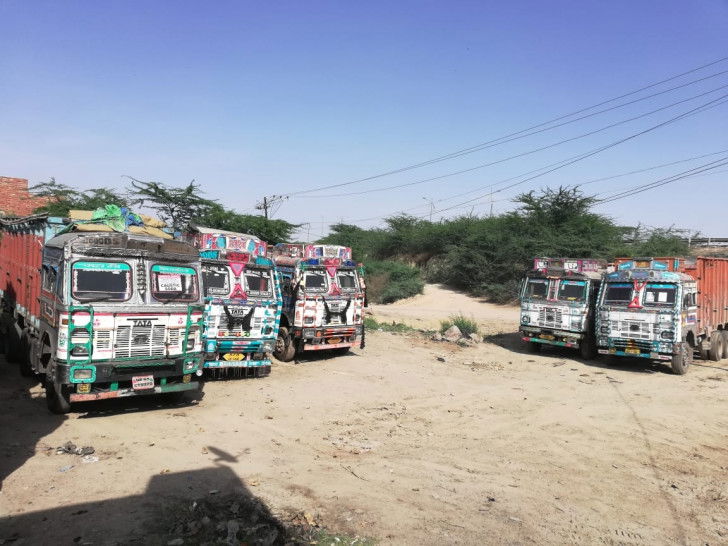Business
Lorry transport in TN affected as retail fuel outlets go dry

Chennai, June 17
With the retail fuel outlets in Tamil Nadu going dry, especially in districts like Chennai, Salem, Tenkasi and Theni districts, the lorry transportation within the state has been adversely affected.
A representative of the Tamil Nadu Lorry owners association while speaking to IANS said that there are heavy restrictions in filling the fuel tanks in Public sector oil outlets like BPCL and HPCL leading to the lorry owners depending on private players to fill their fuel tanks. This has affected the cost and transport from Chennai to Salem costing Rs 2,000 more than the general rate.
The lorry owner association is contemplating halting the services in the state until the retail fuel outlets are supplying fuel properly.
Sources in the industry told IANS that the depots of HPCL and BPCL are not filling more than 100 tankers a day which is a minuscule volume when compared to the demands in retail fuel outlets. The retail fuel outlets complain that these petroleum companies are favouring high-volume dealers or those who have connections with the top echelons of these companies.
It is to be noted that since the Union Government slashed the fuel taxes in May 2022, the Oil Marketing Companies (OMCs) have reportedly been incurring heavy losses. The OMCs have ever since started rationing the supply of fuel to retail outlets and the public sector companies like BPCL and HPCL have commenced rationing the supply of fuel to retail outlets. Interestingly private players like Reliance and Nayara have also followed the policies adopted by the public sector undertakings and have rationed their supply to retail fuel outlets. However, the Shell company has been sustaining their operations by pricing the products much higher in their retail bunks.
The Tamil Nadu Petroleum Dealers Association (TNPDA) and their counterparts in 18 states of the country have already submitted a memorandum to the Union petroleum ministry regarding the lack of supply and change in payment methods. According to the TNPDA, oil marketing companies have stopped issuing credit supplies to the retail fuel outlets.
The supply has now been restricted to only those who pay upfront money and even to those who make such a payment, supplies have been drastically cut.
Sources in the industry told IANS that with the crude oil prices shooting up and the rupee to dollar exchange rate also increasing, the issue is likely to heat up in the coming days creating woes for the people of the state.
The ration supply of fuel in Tamil Nadu has directly affected the agriculturists who are depending on diesel for operating their generators and driving tractors.
With the truck industry on the verge of going on a strike, the prices of essential commodities in the state will also shoot up and with Tamil Nadu being the hub of trucks in the country, this may lead to rising prices across the country.

5 minutes ago
GOPIO International Engages with Former Minister Smt. Meenakshi Lekhi

9 minutes ago
AAPI, American Academy of Yoga and Medicine, and India’s Ministry of AYUSH to Host Groundbreaking Conference on Integrative Health in Memphis, TN

25 minutes ago
US Senate votes to end shutdown, paving way for government reopening

26 minutes ago
US lawmakers move to halt China's toxic vape invasion threatening American youth

1 hour ago
Gov. Greg Abbott Announces Fourth-Term Bid at Houston Event

4 hours ago
"People that are against tariffs are fools": Trump says at least $2,000 dividend a person coming for Americans

4 hours ago
Explosive claims rock Dhaka; Ex-Minister points finger at US Aid giant, Clintons in Hasina's downfall

4 hours ago
"What a terrible thing for Democracy!": Trump decries BBC executives over reports of doctoring speech

5 hours ago
Mukesh Khanna says 'Glad to see that the essence is alive' as Shaktimaan Returns in a new avatar

5 hours ago
Censor Board clears Arjun, Aishwarya Rajesh-starrer 'Theeyavar Kulai Nadunga' for release with U/A certificate

5 hours ago
Keerthy Suresh's 'Revolver Rita' to now hit screens on November 28

5 hours ago
Karan Johar says 'this means everything to us' after Martin Scorsese hosts Homebound NYC screening

5 hours ago
Jorma Tommila can create emotions with almost no dialogue, says 'Sisu' director Jalmari Helander






















